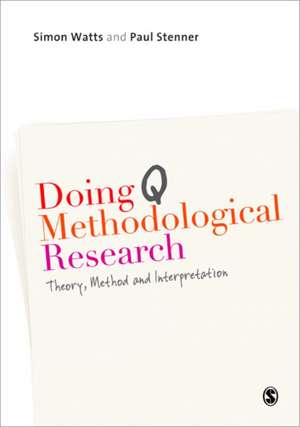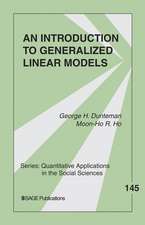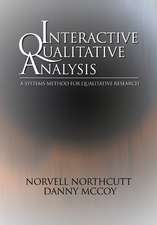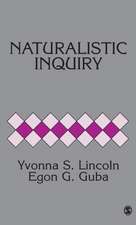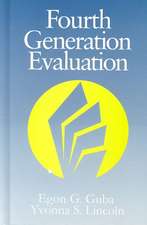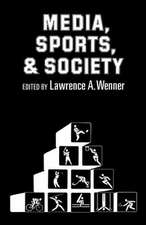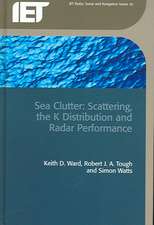Doing Q Methodological Research: Theory, Method & Interpretation
Autor Simon Watts, Paul Stenneren Limba Engleză Paperback – 18 mar 2012
• important design issues
• the conduct of fieldwork
• all the analytic processes of Q methodology, including factor extraction, factor rotation and factor interpretation.
Drawing on helpful conceptual introductions to potentially difficult statistical concepts and a step-by-step guide to running Q methodological analyses using dedicated software, this book enables interested readers to design, manage, analyse, interpret and publish their own Q methodological research.
| Toate formatele și edițiile | Preț | Express |
|---|---|---|
| Paperback (1) | 375.28 lei 3-5 săpt. | +21.19 lei 6-10 zile |
| SAGE Publications – 18 mar 2012 | 375.28 lei 3-5 săpt. | +21.19 lei 6-10 zile |
| Hardback (1) | 1063.32 lei 6-8 săpt. | |
| SAGE Publications – 18 mar 2012 | 1063.32 lei 6-8 săpt. |
Preț: 375.28 lei
Nou
Puncte Express: 563
Preț estimativ în valută:
71.82€ • 74.19$ • 59.77£
71.82€ • 74.19$ • 59.77£
Carte disponibilă
Livrare economică 05-19 martie
Livrare express 18-22 februarie pentru 31.18 lei
Preluare comenzi: 021 569.72.76
Specificații
ISBN-13: 9781849204156
ISBN-10: 1849204152
Pagini: 248
Dimensiuni: 170 x 242 x 18 mm
Greutate: 0.36 kg
Ediția:1
Editura: SAGE Publications
Colecția Sage Publications Ltd
Locul publicării:London, United Kingdom
ISBN-10: 1849204152
Pagini: 248
Dimensiuni: 170 x 242 x 18 mm
Greutate: 0.36 kg
Ediția:1
Editura: SAGE Publications
Colecția Sage Publications Ltd
Locul publicării:London, United Kingdom
Recenzii
This is the book the Q community has been waiting for! Aspirational Q researchers will find it a comprehensive, balanced and thorough guide, taking them systematically from refining their research question(s) to publishing their first Q methodological study
Wendy Stainton Rogers
Professor Emerita, The Open University
Watts and Stenner's fresh, comprehensive introduction to Q methodology factor analysis and interpretation is consistently sensitive to the less-experienced researcher's need for clear explanations and extensive supporting details. All Q researchers will value its range of practical tips and elaboration of important concepts
Amanda Wolf, Editor, Operant Subjectivity: The International Journal of Q Methodology
According to the Q community this is' the book which they have been waiting for. To date, there lacked a book in which the simple and robust method is introduced. As a teacher and researcher, I am glad Watts and Stenner fill this gap with their book.[...]The content of Doing Q methodological research is divided into three parts, respectively into theory, method and interpretation. The book is peppered with examples and case studies and the authors give advice on very practical matters, such as conducting fieldwork, working with the participants and conducting good data management.
This is a comprehensive, clear, ‘one-stop start’ to the method with some very useful chapter summaries and appendices. [...]Together with the all-important recommended free software package for the data analysis if you were thinking of taking this approach this would be a good place to begin.
Wendy Stainton Rogers
Professor Emerita, The Open University
Watts and Stenner's fresh, comprehensive introduction to Q methodology factor analysis and interpretation is consistently sensitive to the less-experienced researcher's need for clear explanations and extensive supporting details. All Q researchers will value its range of practical tips and elaboration of important concepts
Amanda Wolf, Editor, Operant Subjectivity: The International Journal of Q Methodology
According to the Q community this is' the book which they have been waiting for. To date, there lacked a book in which the simple and robust method is introduced. As a teacher and researcher, I am glad Watts and Stenner fill this gap with their book.[...]The content of Doing Q methodological research is divided into three parts, respectively into theory, method and interpretation. The book is peppered with examples and case studies and the authors give advice on very practical matters, such as conducting fieldwork, working with the participants and conducting good data management.
This is a comprehensive, clear, ‘one-stop start’ to the method with some very useful chapter summaries and appendices. [...]Together with the all-important recommended free software package for the data analysis if you were thinking of taking this approach this would be a good place to begin.
Cuprins
PART ONE: THEORY
Introducing Q Methodology: The Inverted-Factor Technique
Theory and Q Methodology: From Stephenson to Constructionism
PART TWO: METHOD
Basic Design Issues: Research Questions and Q Sets
Doing the Fieldwork: Participants, Materials and Procedure
Understanding the Analytic Process (1): Factor Extraction
Understanding the Analytic Process (2): Factor Rotation and the Preparation of Factor Arrays
PART THREE: INTERPRETATION
Factor Interpretation
Writing and Publishing Q Methodological Papers
Appendices
General Instructions for Completing a Q Methodological Study
Conducting an Analysis Using PQ Method: A Step-by-step Guide (plus an explanation of the PQ Method output or .lis file
First Draft Crib Sheets (for study factors 2, 3, 4 and 5)
Introducing Q Methodology: The Inverted-Factor Technique
Theory and Q Methodology: From Stephenson to Constructionism
PART TWO: METHOD
Basic Design Issues: Research Questions and Q Sets
Doing the Fieldwork: Participants, Materials and Procedure
Understanding the Analytic Process (1): Factor Extraction
Understanding the Analytic Process (2): Factor Rotation and the Preparation of Factor Arrays
PART THREE: INTERPRETATION
Factor Interpretation
Writing and Publishing Q Methodological Papers
Appendices
General Instructions for Completing a Q Methodological Study
Conducting an Analysis Using PQ Method: A Step-by-step Guide (plus an explanation of the PQ Method output or .lis file
First Draft Crib Sheets (for study factors 2, 3, 4 and 5)
Notă biografică
Simon Watts is PGR Training Coordinator and Deputy Head of the Graduate School in the Faculty of Social Sciences at the University of East Anglia, UK. He is responsible for organizing all the research, professional development, and advanced training programs for PGR students within the faculty and teaches extensively on these programs. He primarily publishes instructional papers in the area of research methodology/skills, is particularly well known for his work with Q methodology, and is lead author of the Sage publication `Doing Q methodological research: Theory, method, and interpretation¿ (co-authored with Professor Paul Stenner at the Open University). Simon¿s various book and journal publications have been cited in excess of 2000 times since 2012.
Descriere
A thorough and intelligent intro to the theory and method of Q from big name authors in a market where there is little competition.
